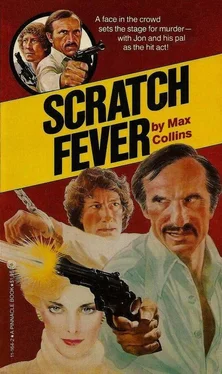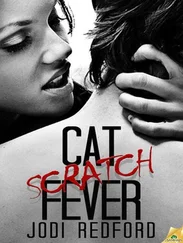Certainly not stage fright — she’d been singing with rock bands since junior high — but some other kind of scared, something in her stomach that was far worse than butterflies.
Something cold.
Something alive.
Fear.
When the song was finished, she rushed over to Jon and whispered, “Fill in with something. I need a few minutes.”
Jon nodded, and away from the mike, stage-whispered to Les, Roc, and Mick to “forget the list — do ‘Light My Fire’ next,” a song Toni didn’t do anything on, which would give her a chance to take a break.
She stood inside the cubbyhole room stage right as the band went into the old Doors classic, Jon doing right by the elaborate pseudo-baroque organ break at the beginning. She was breathing hard. She wanted a smoke. She’d given it up two years ago and rarely had felt the urge since the first hard months, but now she wanted a smoke. She went out and bummed one off Tommy, the roadie, sitting at his sound board halfway down the dance floor, over stage left. Then she returned to the cubbyhole, sucking in smoke as if it was food and she was starving.
Mick was singing. He didn’t sing very well, and in fact was incurably flat, but the Doors tune lent itself to that: the late Jim Morrison was known for many things, but singing on key wasn’t one of them. Then the band went into the instrumental section of the song, Jon taking the organ solo, a sing-song thing that climbed the scale in mindless little would-be Bach progressions.
She wondered if that big sandy-haired guy — Jesus, was he big — was still in his booth, waiting for his mythical phone call. She decided to find out. She’d have plenty of time; this song went on for nearly ten minutes. She wandered back through the club, nodding as fans touched her arm and made comments about the sad fact that the Nodes were splitting, and then she was in the bar, where the big sandy-haired guy was sitting in the booth, talking intensely with a woman.
A woman in white with a black cardigan and tinted glasses and a beautiful face and — even seated in a booth it was obvious — a beautiful body.
Suddenly the cigarette was burning her throat I knew there was a reason I quit these fucking things , she thought, and went up to the bar and put the cig out in an ashtray up from the bottom of which a little picture of Bob Hale stared. Standing next to her at the bar were two young women.
Toni had seen these women before; they had been to hear the Nodes at the Ramp in Burlington a few months ago, part of a group of half a dozen hard, hoody-looking bitches, one of whom had been attracted to Jon, and vice versa. She was one of the two at the bar, a lanky brunette about nineteen, in jeans and jeans jacket and a Nodes T-shirt; lots of eye makeup, and smoking a cigarette.
The other woman was in her early twenties, medium height, boyish build — nothing remarkable, other than the close-set beady eyes, the lump of a nose, the thick lips with permanent, humorless sneer, the dishwater blonde hair greased back in a ducktail, the black leather jacket and red T-shirt and jeans, cigarette dangling from the Presleyesque lips, a hand on the other girl’s shoulder.
Toni couldn’t remember their names, but she did remember that the night Jon and the brunette had spent a break in the band’s van, the beauty with the ducktail had come up and smiled at Jon during the next break and, cleaning her nails with a switchblade, told Jon if he ever touched Darlene ( that was the first girl’s name; what was the second one’s?) again, she would cut his balls off and hang ’em over her rearview mirror. Jon hadn’t argued with her. He’d tried to make a joke out of it later, about what a cornball creep that dyke was, doing her Sha Na Na routine. But it hadn’t come off: Jon knew the dyke had meant what she said.
Terrific, Toni thought It wasn’t enough somebody shows up from the part of Jon’s past that included that thief Nolan; the dyke and Darlene had to turn up, too. Wonderful.
She ducked back into the club. Jon was still playing his organ solo, getting ready to let Roc take over on guitar.
“Light My Fire”—the baroque opening, anyway — had been the first thing she’d ever heard Jon play on the organ. She’d been in a music store in Iowa City — the Sound Pit — looking at PA equipment with some of those jerks in her old band, Dagwood, and Jon was playing a Crumar portable organ, asking the clerk if he knew anywhere he could find an old Vox Super Continental. The clerk was trying to sell Jon a Moog synthesizer, telling him nobody played combo organ anymore, and Jon was saying, “Bullshit, the punk and new wave bands are all using old Vox and Farfisas.”
When she heard that she knew she’d found a kindred spirit. She started up a conversation with him, and soon they were having a drink at the Mill, a bar in downtown Iowa City, and then they were in bed at his apartment, or anyway the room he kept on the bottom floor of the antique shop he’d inherited from his uncle, a shop that had been closed since the uncle’s death.
Rock’n’roll, it seemed, was not Jon’s first love. He lived in a cartoonist’s studio, with drawing board, boxes of comic books, posters of comic strip characters like Dick Tracy and Batman and Tarzan, some framed original strips, making a gray-walled, cement-floored former storeroom a four-color shrine to comic art. Even the finely carved antique headboard of the bed they were in had some drawings tacked to it — Jon’s own work, and good work it was, at that.
“Are you a musician or a cartoonist or what?” she’d asked him, letting the sheet fall to her waist as she turned to look at his drawings; she liked her breasts and liked having him look at them as she looked at his art.
“I don’t know if I’m either anymore,” he said. He was sitting up in bed with a pillow propped behind him. His chest was almost completely hairless, she noted.
“What do you mean by that?”
“I’ve been at this cartooning shit for as long as I can remember.”
“Oh, and you’re all of twenty.”
“Twenty-one. I’d guess that’s about how old you are, too. And I bet you aren’t finding rock’n’roll an easy life, either.”
“You’re right,” she admitted. “I been at it eight years, and it’s a hard go, even if you’re good at it, and I am.”
“Yeah, well, I’m good at cartooning and I’m not making it.”
“It’s hard to make it in any of the arts.”
“No kidding. Oh, I’ve had a couple of things published in the undergrounds. Ever hear of Bizarre Sex ?”
She smiled. “Try me.”
“That’s the name of an underground comic. I’ve done a couple of science fiction parody things for ’em. Doesn’t pay much.”
“It’s a start.”
“But it isn’t a career. I don’t know. I don’t have much interest in commercial art, and the comic book field doesn’t appeal to me; the pay sucks and they’re doing the same old superhero junk, only badly.”
“What about a newspaper comic strip?”
“Landing a syndicated strip is almost impossible, particularly if you don’t do humor, which I don’t.”
“I thought you said you did two parodies for that underground comic.”
“Yeah, but I doubt many newspapers would want to carry ‘Dildos in Space.’”
“You may have a point. So where does music come in?”
“What do you mean?”
“I heard you play the organ. You’re good.”
“Aw, that’s nothing serious with me. I played off and on with some bands when I was in junior high and high school. I don’t think I could make a living at it. And I’m not sure I’d want to, if I could.”
“Why?”
“My mother was in ‘show biz,’ and she had a shitty life, playing piano and singing in bars, on the road all the time, dreaming of being on Ed Sullivan someday, only he’s dead now, and so is she.”
Читать дальше












